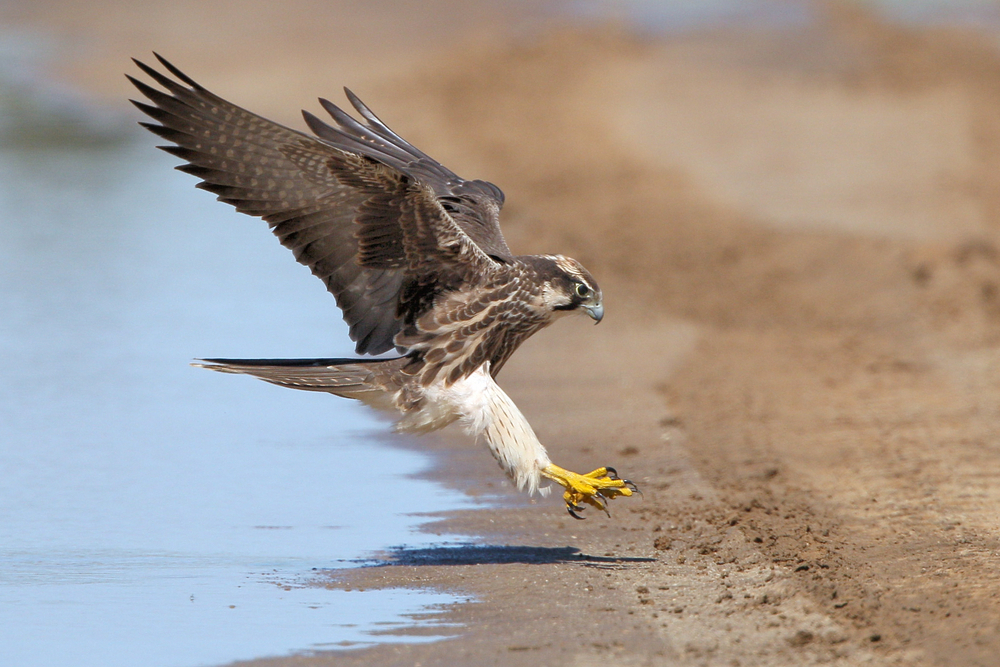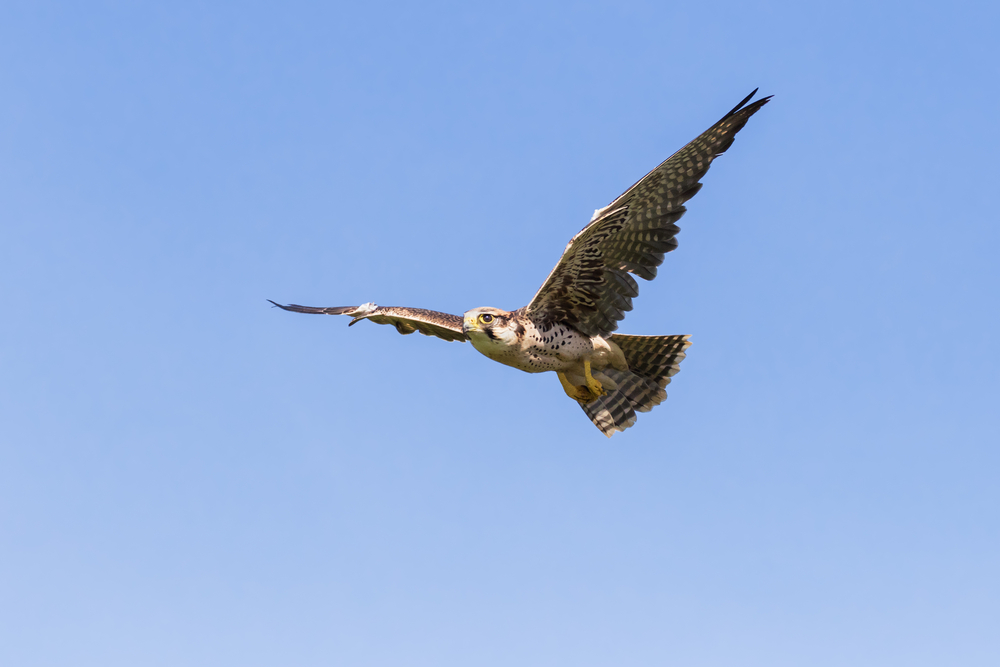All You Need to Know About Falcons in Kuwait

Falcons have long held a place of prestige and cultural significance in Kuwait and across the Arabian Peninsula. These majestic birds of prey are deeply intertwined with the heritage, traditions, and identity of the Kuwaiti people.
They symbolize strength, courage, and nobility, embodying values that resonate deeply with the region’s Bedouin roots.
In this article, we will explore the types, and activities associated with falconry, and how falcons remain a cornerstone of Kuwaiti culture and pride.
Types of Falcons in Kuwait
Kuwait is home to a variety of falcon species, each unique in appearance and prowess. Below are the most popular types admired by falcon enthusiasts in the region:
1. Peregrine Falcon (Falco peregrinus)
The Peregrine Falcon is one of the most prized species in the Middle East. Known for its speed, which can reach speeds of up to 240 km/h during its stoop agility, and hunting prowess, the Saker Falcon has been a favorite of Bedouin hunters for centuries. Its striking plumage, ranging from light brown to grayish tones, and its adaptability to the desert environment make it a sought-after companion for falconers.
2. Gyrfalcon (Falco rusticolus)
The largest of the falcon species, the Gyrfalcon is known for its power and grace. Native to colder climates, this falcon is often imported into Kuwait and is highly esteemed for its beauty and rarity. Its plumage varies from pure white to dark gray, making it one of the most visually stunning falcons.

3. Lanner Falcon (Falco biarmicus)
Smaller than the Saker and Peregrine falcons, the Lanner Falcon is agile and efficient. While less common in Kuwait, it is admired for its hunting skills and calm temperament, making it a good choice for novice falconers.
How to Train a Falcon in Kuwait
Falconry is a cherished tradition in Kuwait, but training a falcon requires patience, dedication, and a deep understanding of these majestic birds. If you’re considering owning and training a falcon in Kuwait, here’s a step-by-step guide to help you start your journey responsibly and successfully.
1. Understand falconry laws in Kuwait
Before acquiring a falcon, familiarize yourself with the regulations surrounding falcon ownership in Kuwait. Some species are protected under international and local laws, and you may need permits to own and train certain types of falcons.
CITES regulations: Ensure your falcon is sourced legally and complies with the Convention on International Trade in Endangered Species of Wild Fauna and Flora (CITES).
Local licenses: Check with Kuwait’s environmental authorities about permits for falcon ownership and hunting rights.
2. Choose the right falcon
Choosing the right falcon depends on your experience and goals. Lanner Falcons are ideal for beginners due to their calm nature, while Barbary Falcons suit intermediates with their agility and speed. Advanced falconers often prefer Peregrine Falcons for their hunting skills or Saker Falcons for their power and desert adaptability.
By matching the falcon’s traits to your skill level, you can ensure a rewarding falconry experience.
3. Acquire the necessary equipment
Falconry requires specific tools and equipment to ensure the bird’s safety, comfort, and effective training:
- A hood to keep the falcon calm by covering its eyes.
- A thick falconry glove protects your hand while handling the bird.
- Jess and leash to tether the falcon securely.
- Perch to Provide a safe resting place for the falcon.
- Lure which is a bait-like tool to simulate prey and train the bird to hunt.
- Telemetry equipment to track the falcon during training or hunting.
4. Begin hand-feeding
Hand-feeding is a critical step in building a bond with your falcon. Offer food directly to the bird while wearing your falconry glove. This process teaches the falcon to associate you with nourishment and care.
- Use small portions of raw meat, such as quail or pigeon, to mimic its natural diet.
- Reward the falcon immediately after it responds to commands.
5. Train the falcon to the glove
Encourage the falcon to land on your gloved hand for food. Begin with short distances, gradually increasing the length as the bird becomes more comfortable. Hold food in your gloved hand to lure the falcon to land. Use a command, such as a whistle or verbal cue, to reinforce the action.
6. Practice hunting skills
Once the falcon is comfortable with basic training, introduce live prey to develop its hunting skills. This step should be conducted under supervision and in line with Kuwaiti hunting regulations. Use small prey like quails or pigeons in controlled conditions. Gradually transition to hunting in the wild.
7. Care for your falcon
Proper care is essential for your falcon’s health and performance.
- Provide a balanced diet of raw meat, ensuring the bird receives essential nutrients.
- Regularly visit a falcon hospital or avian vet for health assessments.
- Keep the bird’s living area clean and spacious, with access to perches and shade.

Falconry Activities in Kuwait
1. Falcon hunting
Traditionally, falconry was a means of hunting game such as houbara bustards and hares in the desert. While modern hunting has declined due to conservation efforts, falconry as a sport remains popular.
2. Falconry competitions
Kuwait hosts several falconry competitions where enthusiasts showcase their birds’ speed, agility, and obedience. These events often attract participants and spectators from across the region, celebrating the skill and tradition of falconry.
3. Falcon training
Falcon training is a meticulous process involving patience, skill, and dedication. Trainers, known as “Saqqar,” work tirelessly to build trust with their birds, teaching them to hunt and respond to commands.
4. Falconry exhibitions and festivals
Kuwait organizes festivals and exhibitions dedicated to falconry, offering a glimpse into this ancient tradition. These events include falcon displays, equipment showcases, and educational programs on falcon conservation and care.
5. Falcon hospitals
To preserve the health and well-being of these valuable birds, Kuwait has specialized falcon hospitals equipped with advanced veterinary care. These facilities underscore the importance of falcons in Kuwaiti culture.
Conservation Efforts and Modern Practices
While falconry remains a cherished tradition, conservation efforts have gained prominence in recent years. Overhunting and habitat loss have threatened certain falcon species, prompting initiatives to protect these birds and their natural habitats. Kuwaiti falconers and organizations actively participate in breeding programs, wildlife conservation projects, and awareness campaigns to ensure that future generations can continue to admire these majestic creatures.
Falcons on 4Sale
In Kuwait, falcons are more than hunting birds; they represent the nation’s culture and traditions. From their main role in Bedouin life to their prominence in modern competitions and conservation efforts, falcons hold a special place in the hearts of Kuwaitis. If you are looking for falcons for sale in Kuwait you can check 4Sale for different types of falcons at different prices. Check our platform now.



